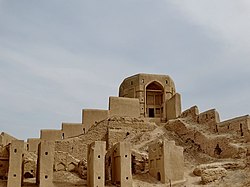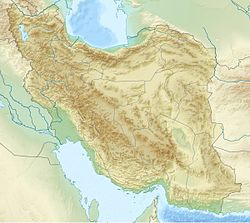Top Qs
Timeline
Chat
Perspective
Zabol
City in Sistan and Baluchestan province, Iran From Wikipedia, the free encyclopedia
Remove ads
Zabol (Persian: ⓘ)[a] is a city in the Central District of Zabol County, Sistan and Baluchestan province, Iran, serving as capital of both the county and the district.[5] Zabol is near the border with Afghanistan.
Remove ads
Demographics
Language and ethnicity
The people of Zabol are a mix of Persians who speak a variant of the Persian language known as Sistani or Seistani, and a small minority of Baloch who speak Balochi, a Northwestern Iranian language.[citation needed]
Population
At the time of the 2006 National Census, the city's population was 130,642 in 27,867 households.[6] The 2011 census counted 137,722 people in 33,957 households.[7] The 2016 census measured the population of the city as 134,950 people in 35,401 households.[2]
Remove ads
Geography
Summarize
Perspective
Location
Zabol is located near Lake Hamun, in the endorheic Sīstān Basin, and the region is irrigated by the Helmand River. Lake Hamun is a seasonal lake that is often dry.
Zabol is connected by road to Milak and Zaranj (across the border in Afghanistan). The Delaram-Zaranj Highway provides road connectivity to the rest of Afghanistan. Zabol thus provides Afghanistan access to the Arabian Sea and Persian Gulf via the Port of Chabahar. Zabol has a regional airport.
Air pollution

The Zabol area is well known for its "120-day wind" (bād-e sad-o-bist-roz), a highly persistent dust storm in the summer which blows from north to south. The disappearance in the 2000s of the nearby Hamoun wetlands has exacerbated the dusty conditions in Zabol,[8] leading the World Health Organization to name Zabol the most polluted city in the world in 2016.[9] A 2017 study in the journal Preventive Medicine suggested that the harm from 30 minutes of cycling outdoors in Zabol's polluted air would outweigh the benefits of the exercise.[10]
Climate
Zabol has a hot desert climate (Köppen climate classification BWh).
Remove ads
Colleges and universities

The city is home to Zabol University, the largest university in the city, as well as the Zabol Medical Science University and the Sistan Museum of Anthropology.
- Islamic Azad university, Zabol Branch
- Payame-noor university of Zabol
See also
Media related to Zabol at Wikimedia Commons
Notes
- Also romanized as Zâbol; also known as Zābul. Referred to as Sistan until the late 1920s, the city was renamed Zabol by Reza Shah Pahlavi[3][4]
References
Wikiwand - on
Seamless Wikipedia browsing. On steroids.
Remove ads



